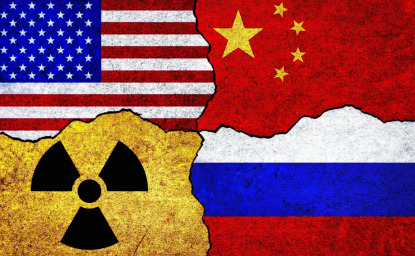The tumultuous events of recent years have led policymakers to question long held assumptions of international cooperation. The COVID-19 pandemic, the war in Ukraine, the rise of strong men, and the rapid acceleration of climate related disasters have all fueled a profound reevaluation of policy across the board.
In the seven short years since President Biden served as vice-president, the world has become a very different place and his international initiatives in the fields of security and diplomacy have been well considered, balanced, and courageous.
In trade policy, however, a steady hand is absent. Where the administration has been sure-footed on NATO and diplomatic initiatives, it has been adrift on trade. Buffeted by the cross currents of anti-globalization and deeply held suspicions of China, Washington— long the global bastion of support for open markets and rules-based trade—has turned its back on trade as a tool for economic growth and to reinforce international relationships. In rejecting conventional trade agreements and abandoning its leadership position in the World Trade Organization, Washington has undermined its friends and given comfort to its enemies. Today’s US trade policy is simply not sustainable and is robustly at odds with the more statesmanlike and ally reassuring policies on NATO and climate change.
Just as the Ukraine war has reaffirmed the value of alliances like NATO, the United States needs to shore up its trading relationships if it is to continue to wield influence and shape policies around the world.
A divided Congress and an uncertain economy mean there is very little likelihood of serious trade initiatives emerging from the United States for at least the next two years. But administration officials would be wise to use this period to reflect on how trade can best serve US interests economically, strategically, and diplomatically.
Here are five things that the administration should consider:
1. Begin the process of engagement to join the Comprehensive and Progressive Trans-Pacific Partnership.
In 2016, the Obama administration negotiated and signed the then 12-country Trans-Pacific Partnership, or TPP, and Vice President Biden was a strong supporter. The deal wasn’t really about trade but about geopolitics, specifically bolstering US influence in Asia and parts of Latin America. The objective was to check China’s rise in the region. The agreement would cut tariffs, support digital trade, and curb the power of state-run entities. But the agreement was never ratified by Congress and Donald Trump pulled the plug on the deal on his third day in office the following year. The other 11 members went ahead and fashioned the newly named Comprehensive and Progressive Trans-Pacific Partnership, or CPTPP, which closely mirrored the TPP. According to the Washington-based Peterson Institution for International Economics, US entry into the original TPP would have boosted US incomes by $131 billion a year, or 0.5% of GDP. Moreover, with US exporters disadvantaged due to less favorable terms of trade than CPTPP members, another $2 billion in income gains has been sacrificed. President Biden has been reluctant to reengage with the CPTPP countries even as the door remains wide open for the US to reenter. Clearly, some changes would need to be negotiated to the agreement to make US participation more politically palatable. Several excellent suggestions have been described by Wendy Cutler and Clete Willems in the report they released in December for the Asia Society. Specifically, they say the agreement needs stronger rules of origin to block Chinese-made vehicles from entering the US market duty free. They call for stronger environment and labor provisions, and tougher rules for addressing currency manipulation. While the US sits idly by, China is building its trading relationships in the Asia-Pacific by leading the 15-nation Regional Comprehensive Economic Partnership and seeking membership in the CPTPP. To regain the upper hand in this vitally important region, Washington should cement its relationships with key players. Joining the CPTPP would be one very good way to do that.
2. Strike a deal with the European Union on data privacy and protection to open the door for setting the global standard for digital trade.
A majority of WTO Members (87) are looking to strike this year a deal on electronic commerce, which would establish a single set of rules for entrepreneurs who conduct digital business. The key outstanding issues concern cross border data flows, where data can be stored, and rules against forced transfer of source code. Three distinct groups of countries have emerged around these questions, one group led by the United States, and the CPTPP countries, which favor smooth data flows and no restrictions on where data flows. A European Union led group puts the emphasis on the rights of citizens, particularly with respect to data protection and privacy. The third group is led by China and emphasizes national security and public order above all. Many who follow these talks agree with Pascal Kerneis, managing director of the European Services Forum and a longtime advisor to the EU Commission, that should the first two groups agree on a common framework, the global standard would be set. Participating countries would make up roughly two-thirds of global GDP, and would include all the major players apart from China and India. But for that to happen the EU and the US would have to agree between themselves. Disagreement between Brussels and Washington has been forged largely by cultural and legal differences but also through a fundamental breach of trust that was fueled by the 2015 revelation by Wikileaks that the US National Security Agency had tapped the phones of then Chancellor Angela Merkel and other top German officials. In response, Brussels drafted and implemented the General Data Protection Regulations in 2018, which obliges companies holding data on EU citizens to protect that data, to obtain the consent of those whose data is held, and to ensure that processed data is accurate. The Biden administration has worked hard at rebuilding trust with the EU on the question of data privacy. The president signed an executive order in October 2022 reining in US intelligence agencies, limiting their access only to what is “necessary and proportionate” to protect national security. The effort has been appreciated in the EU, where the new approach must still be ratified among the 27 members. Codifying this agreement in the WTO would go a very long way to establishing the common set of guidelines that businesses large and small have long maintained is critical to bringing down costs and making trade more inclusive.
3. Refashion and modernize the African Growth and Opportunity Act to account for the evolution of the African Continental Free Trade Area.
Encompassing 55 countries and 1.3 billion people, the African Continental Free Trade Area, or AfCFTA, which entered into force in 2018, is the world’s largest free trade area. It is very much a work in progress. Today intra-African trade represents only around 25% of total African trade. This marks an improvement, and in some parts of the continent—notably East Africa—the percentage is higher. But the reasons why African countries trade so little between each other are manifold and deep seeded. An underdeveloped private sector, a lack of support for female entrepreneurs (who conduct roughly 70% of informal cross border trade in Africa), widespread corruption, and a serious shortfall in infrastructure development, have all contributed to more cloistered economies in Africa. An agreement between the United States and AfCFTA could be a catalyst for forging a more unified African market. It would certainly send a powerful signal to African leaders that Washington values its relationship with Africa. The Biden-led Partnership for Global Infrastructure Initiative will mobilize some $600 billion in funding for developing countries by 2027, and Africa will be a big beneficiary. This is a solid first step but it must be followed with serious efforts to strengthen the business relationship between the United States and Africa. It will not be easy. African countries disagree among themselves on many trade policies. But the size of the US market is big enough that the promise of better access to it could forge trans-African supply chains and business networks that could facilitate job creation and industrialization. This in turn could reinforce efforts to make trade in Africa greener, more inclusive, and more democratic. The United States has neglected Africa for far too long—it’s time to turn this around.
4. Look at ways that the US-Mexico-Canada agreement could expand to bring in countries like Colombia.
Instability in Latin America is a major concern. Unrest in Brazil, Peru, Chile, and elsewhere threaten prosperity on America’s doorstep. Overtures to these countries and others would send the signal that Washington values its relations with its neighbors and is prepared to help. The initial objectives may not be full membership in the USMCA but could conceivably include partnerships on standards and other consequential decisions, and may provide a pathway to closer economic relationships. New governments are in place in Brazil and Chile. Elections are scheduled next year in Argentina. Extending a hand of economic partnership to our southern neighbors would highlight US interest in promoting stability and prosperity in the region. Given the recent turbulence that has erupted in so much of Latin America, such a show of support could bring benefits that extend far beyond trade.
5. Reestablish leadership in the World Trade Organization and begin the process of much needed reform to the global trading system.
Absence a strong hand from Washington, reform efforts in the WTO are drifting aimlessly. Nature abhors a vacuum and as the United States dawdles in Geneva there is a risk that ennui settles in, entrenching the rigid processes and mindset that has too often paralyzed the WTO. These reforms can target nuts and bolts issues like enhancing transparency by facilitating a much higher rate of member notifications regarding policy changes. But they should also be directed at reform in areas like agriculture where counterproductive and wasteful policies in most countries hinder efforts at combatting hunger and buttressing the livelihoods of subsistence farmers. This would require reimagining what global agriculture trade should look like and would probably mean scrapping the current dead-end model of negotiations that ran aground 15 years ago. A more realistic and responsive system of dispute settlement is essential. Reining in overreach by dispute settlement panels, bringing greater clarity to the question of national security, and ensuring greater discipline in the filing and consideration of disputes would all be vital elements of any reform effort. Greater use of arbitration could also be considered. On dispute settlement, the other 163 WTO Members very much want something from the United States, and flexibility from Washington could also be leveraged to bring about durable reforms in other areas.
Developing and broadening each of these trade policy planks would enable the Biden administration to send a powerful signal to its friends and allies around the world. An indication that it believes in joint prosperity and working together to achieve mutually beneficial economic, environmental, and strategic outcomes.
Keith M. Rockwell is a global fellow at the Wilson Center’s Wahba Institute for Strategic Competition.
Author

Director of the Information and External Relations Division and Chief Spokesman at the World Trade Organization (retired)

Wahba Institute for Strategic Competition
The Wahba Institute for Strategic Competition works to shape conversations and inspire meaningful action to strengthen technology, trade, infrastructure, and energy as part of American economic and global leadership that benefits the nation and the world. Read more

Explore More
Browse Insights & Analysis
US Inaction Is Ceding the Global Nuclear Market to China and Russia

Promoting Convergence in US-Brazil Relations


